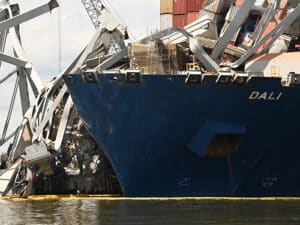
VIDEO: Maersk and DFDS join partnership aiming for industrial-scale sustainable fuel production
Written by Nick Blenkey
Søren Skou, CEO, A.P. Moller - Maersk: “This project provides a first step in the massive transformation to produce and distribute sustainable energy.”
Shipowners A.P. Moller – Maersk and DFDS have joined a Danish partnership that plans to develop an industrial-scale production facility in the Copenhagen area to produce sustainable fuels for maritime, road and air transportation. The other project partners include Copenhagen Airports, DSV Panalpina, SAS and Ørsted.
“Decarbonizing the transport sector is a significant and complex task that requires collaborative contributions from every company, organization, and country,” says Søren Skou, CEO, A.P. Moller – Maersk. “This project provides a first step in the massive transformation to produce and distribute sustainable energy.”
“The cooperation of fuel users and producers along with scientists and society is the fastest way to make sustainable fuels available as realistic alternatives to the fossil fuels we combust in our vehicles and vessels today,” says Torben Carlsen, CEO, DFDS. “I hope that this partnership and our project will help us reach our goal of operating zero-emission ferries and trucks much faster than we had originally anticipated.”
Bringing together the demand and supply side of sustainable fuels, the partnership hopes to develop a new ground-breaking hydrogen and e-fuel production facility as soon as 2023. When fully scaled-up by 2030, the project could deliver more than 250,000 tonnes of sustainable fuel for buses, trucks, maritime vessels, and airplanes every year. Production would potentially be based on a total electrolyzer capacity of 1.3 gigawatts, which would likely make it one of the world’s largest facilities of its kind. The production from the fully scaled facility can reduce annual carbon emissions by 850,000 tonnes.
If realized as envisaged, the project will be located in the Greater Copenhagen Area and could supply renewable hydrogen for zero-emission buses and heavy-duty trucks, renewable methanol for vessels and renewable aviation jet fuel. The project will require a large-scale supply of renewable electricity, which could potentially come from offshore wind power produced at Rønne Banke off the island of Bornholm.
Today, such sustainable fuels come at a higher cost than fossil-based fuels. To become competitive with fossil fuels, say the partners, the production of sustainable fuels will need to be matured, built at industrial scale, and go through a cost-out journey similar to what has been seen over the past decade in other renewable energy technologies, such as offshore wind, onshore wind and solar photovoltaic.
The industrial partners see this project as a way to combine the dual objectives of accelerating the green transformation and providing economic stimulus to the Danish economy post the COVID-19 crisis.
The first stage, which could be operational by 2023, comprises a 10 MW electrolyzer which can produce renewable hydrogen used directly to fuel buses and trucks.
Stage two comprises a 250 MW electrolyzer facility which could be operational by 2027 when the first offshore wind power from Bornholm could be delivered. This facility would combine the production of renewable hydrogen with sustainable carbon capture from point-sources in the Greater Copenhagen area to produce renewable methanol for maritime transport and renewable jet-fuel (e-kerosene) for the aviation sector.
Stage three, which could be operational by 2030 when the offshore wind potential at Bornholm has been fully developed, would upgrade the project’s electrolyzer capacity to 1.3 GW and capture more sustainable CO2, enough to supply more than 250,000 tonnes of sustainable fuels to be used in buses, trucks, maritime vessels and airplanes. The project has the potential to displace 5% of fossil fuels at Copenhagen Airport by 2027 and 30% by 2030.
The partnership will now engage in dialogue with the regulatory authorities on the framework and policies needed to support the development of using sustainable fuels at scale in the transport sector in Denmark, and to seek public co-funding to conduct a full feasibility study of the project. If the feasibility study confirms the viability of the project vision, a final investment decision for the first stage of the project could likely be taken as soon as 2021.




